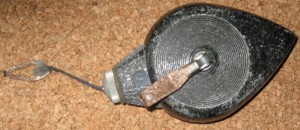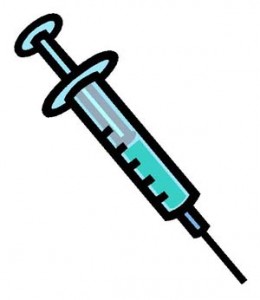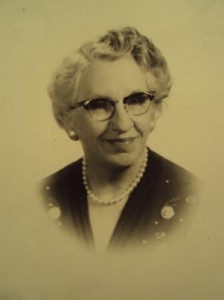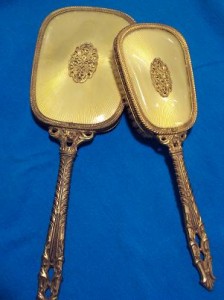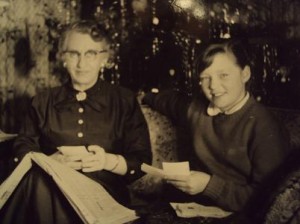In 1972, my brother-in-law taught me how to hang wallpaper. Before he started on our red and blue hounds-tooth paper, he made a plumb line using a metal tool shaped like a teardrop, inside of which was a coiled string sitting in powdered chalk. Bervin pulled out the string and dangled it from ceiling to floor, a small lead weight tied to its end. One quick snap of the chalky string made a perfectly straight start-line for our wallpaper.
Today in my Michigan cottage, Drew began laying floor tiles with a similar process. After measuring and studying the floor, he stretched and snapped his plumb line in three critically important lines.
First he found the exact center of the room by criss-crossing red chalk lines wall-to-wall in both directions, making four 90 degree angles. Then he snapped a perfect 45 degree angle across the other lines so his first row of tile would line up precisely straight.
Scripture references plumb lines in several places, and Jesus, if he was a carpenter, surely had one. Biblical plumb lines were usually synonymous with God’s Word, his standard of righteousness. (The word “righteous” actually means “upright”, very close to “straight up and down,” which is what “being plumb” means.)
In Old Testament days, God measured his people against the plumb line of his Word. He hasn’t changed since then, nor has the Bible. Come to think of it, human nature is the same, too. Righteousness is as unattainable for us now as it was for them. None of us can measure up.
In building our lives as we please, our plumb lines become wobbly and wouldn’t even be good for wallpapering a room or tiling a floor. And wobbly standards make for unstable lives. In the ‘60’s young people used to say, “If it feels good, do it.” That reasoning draws a wiggly plumb line, and taken to its farthest extreme, becomes Osama Bin Laden. This man’s plumb line was a self-created standard of right and wrong having nothing to do with our God’s unchangeable measurements of righteousness.
But God has kept the books on Bin Laden, just as he keeps the books on the rest of us. Although we see ourselves as better than this evil man, Scripture puts us all in the same category. “All… are under sin. As it is written, ‘None is righteous, no not one’.” (Romans 3:9-10)
Being righteous can’t be found in our opinion of what’s good or bad. The only chance we have is to accept the righteousness of the one person who did measure up to God’s plumb line: Jesus. He offered to share his righteousness with us by dying for our sins, an offer that stood for Bin Laden, too, though he rejected it in favor of his own shaky plumb line.
Thankfully, Jesus Christ will one day return to earth as our ruling monarch. When that happens, one snap of his plumb line and everything we’ve made crooked in this world will quickly be made straight.
“This is what the Sovereign Lord says: I will make justice the measuring line and righteousness the plumb line.” (Isaiah 28:16a,17)



